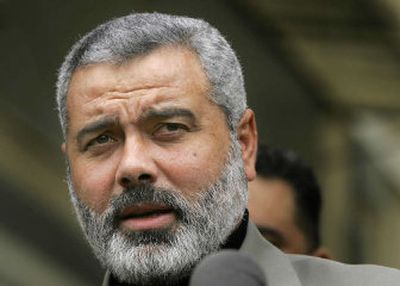Hamas leader denies wanting peace in stages

GAZA CITY, Gaza Strip – The Palestinians’ incoming prime minister said Sunday that Hamas is interested in a long-term truce with Israel but has no intention of seeking a formal peace agreement that would recognize the Jewish state.
Also on Sunday, Israel’s acting foreign minister said Palestinian leader Mahmoud Abbas is “not relevant” because of the election victory by the militant group Hamas.
Israel and the U.S. consider Hamas, winner of January’s Palestinian elections, a terrorist group. Hamas does not recognize the existence of a Jewish state in the Middle East and has sent dozens of suicide bombers into Israel, killing hundreds.
Ismail Haniyeh – the incoming Palestinian prime minister – on Sunday denied saying Hamas would consider peace with Israel under certain conditions.
Haniyeh was quoted by the Washington Post in its Sunday edition as saying Hamas would establish “peace in stages” if Israel would withdraw to its 1967 boundaries – before it captured the West Bank, Gaza Strip and east Jerusalem.
But Haniyeh told reporters that his comments had been misunderstood. He said he was not referring to a peace agreement, only a “political truce.” Hamas official Sami Abu Zuhri told the Associated Press that Haniyeh’s comments must have been mistranslated.
Haniyeh has demanded that Israel make a full withdrawal from lands captured in the 1967 Mideast war, release Palestinian prisoners and allow the return of several million Palestinian refugees and their descendants to Israel.
“Then Hamas can grant a long-term truce,” Haniyeh said.
Israel has turned down the demands. While accepting the principle of an independent Palestinian state, Israel has said that it has no intention of returning to its prewar borders or accepting the return of refugees.
Israel says it will refuse to deal with a Hamas government unless the group recognizes the Jewish state, disarms and accepts past peace accords with Israel. Until Hamas meets these conditions, “everything else is empty words,” said Cabinet Minister Roni Bar-On.
On Sunday, Israel’s acting foreign minister said Abbas is “not relevant” because of the victory of Hamas’ win in last month’s elections and its takeover of the Palestinian parliament and Cabinet.
Tzipi Livni spoke after meeting U.S. envoy David Welch. The two discussed how to relate to Abbas, the Fatah leader who is president of the Palestinian Authority, in light of the landslide Hamas victory over Fatah. Last week Abbas picked Hamas leader Ismail Haniyeh to form a new Cabinet.
Livni’s statement reflected an apparent difference in approach between Israel and the U.S. Israel Radio reported that Welch put forward a policy in which the U.S. would work with Abbas instead of the Hamas-led government, but Israel rejected that.
Livni told Israel Radio that Abbas “can’t be a fig leaf for a terrorist authority.” She said the Hamas government must decide about Israel’s demands for recognition and renunciation of terrorism, and Abbas “in this regard is not relevant.”
Without referring to the radio report, Micaela Schweitzer-Bluhm, spokeswoman of the U.S. consulate in east Jerusalem, said, “In terms of Abu Mazen (Abbas), we remain fully committed and supportive of him.”
Palestinian negotiator Saeb Erekat called Livni’s remarks “totally unacceptable.” Erekat, from Fatah, said: “The Israelis are trying to undermine the Palestinian people in general because they don’t differentiate between one Palestinian and the other.”
In Jordan, Hamas lawmakers Mahmoud Zahar and Saeed Syiam dismissed any future peace talks with Israel, calling past negotiations “a failed experiment” and said Arab nations had rejected U.S. pressure to force the militant Palestinian movement to moderate.
“We don’t consider the Israeli enemy a partner. By winning the elections, we defeated Israel,” Zahar said. “Why should we recognize Israel? Pressure is coming from the United States on us, not from Arab countries.”